|
|
|
Sort Order |
|
|
|
Items / Page
|
|
|
|
|
|
|
| Srl | Item |
| 1 |
ID:
093563
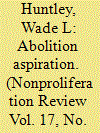

|
|
|
|
|
| Publication |
2010.
|
| Summary/Abstract |
The goal of abolishing all nuclear weapons has often seemed unrealistic, if not utopian. The Cold War posed intractable apocalyptic dangers, and the post-Cold War "peace dividend" proved scant. But over the decades, nuclear arms control and nonproliferation successes have been as important as the setbacks, and in 2010 the abolition aspiration has made something of a comeback. This article surveys the most important challenges facing nuclear disarmament progress today. The article considers the interrelationships among the positions of the key categories of states shaping the contemporary global nuclear order, for good or ill, as a capstone to the other pieces in this special section, which focus on those categories individually. The article concludes that progress toward disarmament will not be easy or fast. Weaning states off their reliance on threats to either use or acquire nuclear arms requires progress in improving the conditions of global governance more generally. But the goal of eliminating the threat of nuclear weapons is a realistic prospect and, consequently, an essential imperative.
|
|
|
|
|
|
|
|
|
|
|
|
|
|
|
|
| 2 |
ID:
144289
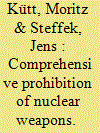

|
|
|
|
|
| Summary/Abstract |
There have been calls for the abolition of nuclear weapons from the day they were invented. Over the last fifteen years, some indications can be found that such calls have been getting louder, among them Barack Obama's famous 2009 speech in Prague. In this article, we investigate if support for a comprehensive norm that would prohibit development, possession, and use of nuclear weapons is really growing. To assess the current status of that norm, we use the model of a “norm life cycle,” developed by Martha Finnemore and Kathryn Sikkink. We then analyze 6,545 diplomatic statements from the review process of the Treaty on the Non-Proliferation of Nuclear Weapons as well as from the UN General Assembly First Committee on Disarmament and International Security, covering the years 2000 to 2013. The evidence shows that a comprehensive prohibition can be considered an emerging international norm that finds growing support among states without nuclear weapons and nuclear weapon states alike. Only a core group of states invoke the norm consistently, however. This leads us to conclude that the “tipping point” of the life cycle, at which adherence to a new norm starts to spread rapidly, has yet to be reached.
|
|
|
|
|
|
|
|
|
|
|
|
|
|
|
|
| 3 |
ID:
181694


|
|
|
|
|
| Summary/Abstract |
While many consider the threat posed by nuclear weapons to be greater than ever, the general public has largely lost interest in the issue of nuclear disarmament. To reinvigorate public support for a nuclear-weapons-free world, disarmament advocates have presented a range of arguments about the necessity of nuclear abolition. This article presents original data from a public-opinion survey of US citizens to examine the relative effectiveness of the most common pro-disarmament arguments. The study found that the least persuasive arguments had to do with the costs of maintaining a nuclear arsenal, the humanitarian impact of nuclear-weapons use, and the threats of nuclear terrorism and nuclear war. The most persuasive arguments related to nuclear-armed ‘rogue states’ and the possibility of nuclear accidents. Political stakeholders and civil-society actors might use these findings to more effectively frame their public messaging.
|
|
|
|
|
|
|
|
|
|
|
|
|
|
|
|
| 4 |
ID:
093557


|
|
|
|
|
| Publication |
2010.
|
| Summary/Abstract |
This special section examines the disarmament dynamics being generated by President Barack Obama and other world leaders in their advocacy of a nuclear-weapon-free world. It explores the responses of five groups of states (nuclear weapon states, threshold states, advocacy states, holdout states, and defiant states) to the new disarmament momentum, assessing whether a global consensus on-and concrete progress toward-nuclear elimination is likely. The main goals of this special section are: to generate scholarly debate on this important subject (the literature has tended to focus on understanding proliferation rather than disarmament dynamics); and to examine the potential consequences of reinvigorated disarmament leadership for the upcoming Review Conference of the Treaty on the Non-Proliferation of Nuclear Weapons, which will be held in New York City in May 2010.
|
|
|
|
|
|
|
|
|
|
|
|
|
|
|
|
| 5 |
ID:
111885
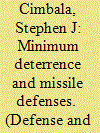

|
|
|
|
|
| Publication |
2012.
|
| Summary/Abstract |
Minimum deterrence is a compromise, or halfway house, between nuclear abolition or nearly zero and assured destruction, the dominant paradigm for strategic nuclear arms control during and after the cold war. Minimum deterrence as applied to the current relationship between the United States and Russia would require downsizing the numbers of operationally deployed long-range nuclear weapons to 1000, or fewer, on each side. More drastic bilateral Russian-American reductions would require the cooperation of other nuclear weapons states in making proportional reductions in their own arsenals. In addition, US plans for European-based and global missile defenses cause considerable angst in Russia and threaten to derail the Obama "reset" in Russian-American relations, despite the uncertainties about current and plausible future performances of missile defense technologies.
|
|
|
|
|
|
|
|
|
|
|
|
|
|
|
|
| 6 |
ID:
095570
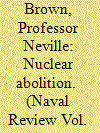

|
|
|
| 7 |
ID:
124785
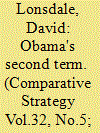

|
|
|
|
|
| Publication |
2013.
|
| Summary/Abstract |
President Obama's policy toward nuclear weapons has seriously undermined the flexibility and credibility of U.S. nuclear strategy. As a consequence of its desire to provide leadership on nuclear abolition, nuclear strategy under the Obama administration is shallow and unconvincing. This article seeks to put strategy back at the center of discourse on U.S. nuclear weapons policy. In this endeavor, and in contrast to Obama's stated stance, this article resurrects some important elements of Cold War strategic thinking on the subject. Warfighting, nuclear bargaining, and escalation dominance are particularly worthy of renewed attention.
|
|
|
|
|
|
|
|
|
|
|
|
|
|
|
|
| 8 |
ID:
107685


|
|
|
| 9 |
ID:
186364
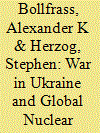

|
|
|
|
|
| Summary/Abstract |
The global nuclear order had been challenged in recent years by individual proliferators, the moribund US–Russian arms-control process and resultant frustration over stalled progress towards disarmament. Then Russia launched its full-scale invasion of Ukraine under cover of nuclear threats against NATO. This has neither exposed the international nuclear-governance regime as toothless nor brought it to the verge of collapse. The global nuclear order’s history shows its resilience to rogue acts by great powers. It will continue to serve key nuclear-capable states’ security and energy interests in the non-proliferation domain. Arms control between Washington and Moscow has always been sensitive to their strategic whims and can be reconstituted. The main consequence of Russian President Vladimir Putin’s war is renewed public awareness of the often unpalatable role nuclear weapons play in international politics. Nuclear targeting, deterrent threats and associated risk-reduction efforts are hardly new phenomena.
|
|
|
|
|
|
|
|
|
|
|
|
|
|
|
|
|
|
|
|
|